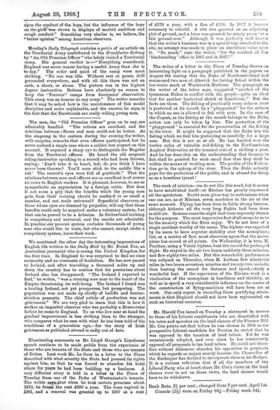The week of aviation—we do not like this word, but
it seems to have established itself—at Rheims has greatly impressed all the spectators. Doubt soon gives way to enthusiasm when one can see, as at Rheims, seven machines in the air at the same moment. Flying has been done in fairly strong breezes, although hitherto all the very long flights had been done in still air. In some cases the night had been expressly chosen for the purpose. The most impressive fact of all seems tons to be the security which the fliers enjoy. We do not hear of a single accident worthy of the name. The biplane was expected by its users to have superior stability over the monoplane; but, as a matter of fact, most observers agree that the mono- plane has scored at all points. On Wednesday, it is true, M. Paulhan, using a Voisin biplane, beat the record for prolonged flight. He stayed in the air two hours and forty-three minutes, and flew eighty-two miles. But this remarkable performance was eclipsed on Thursday, when M. Latham flew ninety-six miles in two hours seventeen minutes and twenty-two teconds, thus beating the record for distance and speed,—truly a wonderful feat. If the experience of the Rheims week is a vindication of the monoplane in handiness and stability, as well as in speed, a very considerable influence on the course of the construction of flying-machines will have been set at work. Our only regret in recording these gratifying attain- ments is that England should not have been represented on such an historical occasion.






































 Previous page
Previous page